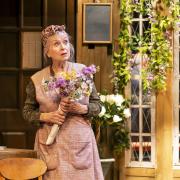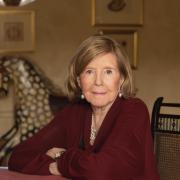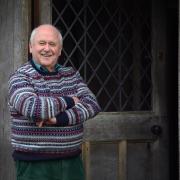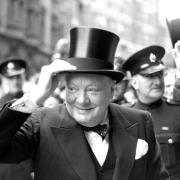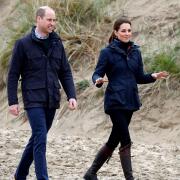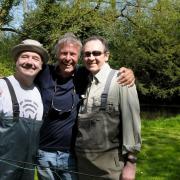Politics has been at the heart of Gillian Shephard’s life for five decades.

Yet one of Norfolk’s most prominent politicians shows little sign of losing any of her enthusiasm and is still as animated, passionate and outspoken as she was when she first entered Parliament a quarter of century ago.
As she makes coffee in the kitchen of her home on the edge of Swaffham, we chat about life in the House of Lords, the joy she finds in her grandchildren and, of course, her new book about Baroness Thatcher.
It was while standing in that same spot, looking out over the wide open empty fields that the idea for the book took shape.
“The radio was on and they were talking about The Iron Lady film and about Margaret Thatcher. I was really outraged by what I was hearing.
“What rankled was not that people criticised her, but that the way they talked about her was so lazy and clichéd. I just thought really this is very unfair on someone who was by any standards, quite extraordinary.”
The book – The Real Iron Lady – is a fascinating glimpse into what it was like to work alongside one of the most divisive characters in British political history. It is also a reminder of Gillian’s own prominent place in politics.
After spending several years working for Norfolk County Council, she became MP for South West Norfolk from 1987 to 2005.
She played a pivotal role in the Conservative Government, holding several posts, including secretary of state for employment and for women’s issues and secretary of state for education (and employment), all under John Major’s premiership. In 2005, on standing down as an MP, she was made Baroness Shephard of Northwold.
The book is full of anecdotes and insights from those who worked alongside Margaret Thatcher at all levels of politics and on all sides – from cabinet secretaries and ministers to those not in the public eye, such as the secretaries (known as the Garden Girls) at Number 10.
“I think in some ways, those are the most interesting pieces as they worked with her day to day behind the scenes. I was genuinely overwhelmed by the response I got when I started mentioning it to people, and by their keenness to contribute.”
It is also full of Norfolk references, from the opening passage in the book, which quotes from a colourful article in the Eastern Daily Press about one of Baroness Thatcher’s earliest visits to the county, to vivid recollections from some of our most prominent politicians.
“What I set out to do was not to correct the clichés but to flesh them out and a give a fuller picture from the people who worked with her most closely,” says Gillian.
“I didn’t want to defend her or whitewash her or analysis policy, but I ended up with a number of views, and actually it really led me to think she was an outsider.”
Perhaps the most insightful and revealing parts of the book are those that show a rarely seen side to Thatcher.
The book touches on her distress when her son Mark went missing during a motor rally in Sahara for six days, another recalls her being informed of a British warship being hit during the Falklands conflict.
“She was about to go on and give a speech to a Conservative women’s conference when she told that lives had been lost,” says Gillian. “Harvey Thomas, who was head of presentation at the Conservative Central Office, was in charge of the conference and recalled it in such stark detail.”
He writes: “Backstage, Margaret’s tears flowed for almost 40 minutes as she felt the burden, of being, as she put it ‘the first Prime Minister in decades to have to send young British soldiers to their death in conflict.’”
Another story, this time from special advisor Elizabeth Cottrell, conjures up a most unexpected image as she recalls an long evening spent with the Prime Minister working on a speech, which saw them cooking dinner then washing up together.
“But I just loved the idea of them working through the night,” says Gillian. “Of them cooking this chicken supreme, standing at the sink in stocking feet.”
There is much in Gillian’s book about Baroness Thatcher’s time at Oxford which reinforces her belief that she never quite fitted in.
“My experience as a student at Oxford was certainly nothing like hers. I found only warmth and encouragement,” she says.
“But for someone who thought that what was important was Conservatism and being a chemist, it must have all been rather a disappointing experience.”
I point out a particularly unflattering piece in the book which refers to the reluctance from her peers to include her socially.
“It is just dreadful, this idea that they only invited her to social events if they wanted a ‘Conservative’,” says Gillian.
“She was clearly out of the environment in which she felt comfortable and in which she had shone. But then I wonder whether she didn’t just bore the pants of people talking about being a Conservative all the time, which just wasn’t terribly fashionable.”
Gillian loves her role in the House of Lords and she has been made deputy chairman of the Government’s social mobility commission, about which she is passionate.
“Do I miss the hustle bustle of the House of Commons? Well sometimes, but I do go in at least once a week for lunch to catch up with people and goings on,” she laughs.
“I miss the repartee and just talking to so many bright and enthusiastic people, but the Lords, while being a more stately place, is equally as fascinating.
“I really believe the Lords is changing and you have a very diverse and rich collection of people. If you are debating something like euthanasia, you can call on the most profound knowledge - you might have bishops, philosophers or medical experts all getting involved; it is quite amazing.”
In the book she details her own selection process for the Conservative seat in South west Norfolk in 1986 – when at her adoption meeting three members resigned publicly as they could not “go home and say to people in their village that the next MP would be a woman”.
“What was amazing was that I really didn’t care,” she laughs. “I just took it in my stride, I took no notice of it and thought it was very silly. Interestingly those people did come to be among my biggest supporters.”
The book also looks at the criticisms levelled at Baroness Thatcher that once in power she did little help women fulfil their potential in politics. However, says Gillian, it is easy to forget just how impressive it was for her to have become prime minister in what was a very different climate for women.
“She seemed to take a great deal of notice of women MPs and what they thought; that was something which really became apparent doing the book and also in my experience.
“As a new MP and a very junior social security minister while she was prime minister, I became aware that every year, people from the Treasury would go to her and suggest Child Benefit should be cut but she wouldn’t do it. As she would say: ‘This is the only payment which goes direct to the mother, it is hers for her children and it must not be touched’.”
Despite her hectic political life in London, she and husband Tom – a retired head teacher – love their time in Norfolk.
“If I was taken away from the land I don’t think I could survive. It might sound bleak but it is true.
“Here I can walk into town in a few minutes but also I look out of the windows and all I see are open fields, I need that.
“When I was at Oxford I used to trail around trying to see some fields and the first thing I would do when I came home to Norfolk would be to take myself off tramping across the countryside.”
Her house is full of photographs of her two grown-up stepsons and her grandchildren, and she describes them as “a gift”.
“It is completely wonderful being a grandmother, it is such an incredible thing to have the pleasure and joy of spending time with them.
“But I love seeing the boys as parents as well, not just the likenesses but seeing how they deal with it as parents themselves as the children grow up.”
Then there are her commitments locally, supporting various organisations and charities - she is currently a Deputy Lieutenant, is president of the Norfolk Association of Local Councils, a trustee of Norwich Cathedrals and she supports many more.
”I just love Norfolk, I love the people and the sense of community, and the very Norfolk sense of humour.”
Gillian grew up in the village of Knapton, about which she wrote a book, and she went to what was North Walsham Girls’ High School, but her home has been the west of the county for many years.
“I love Knapton and where I grew up, but out here it is very under subscribed; it is a beautiful area rich in history.
“One of my favourite places to go in the world is Castle Acre, I really mean that,” she says. “It is so beautiful and the views are extraordinary. It is hard to beat.”










